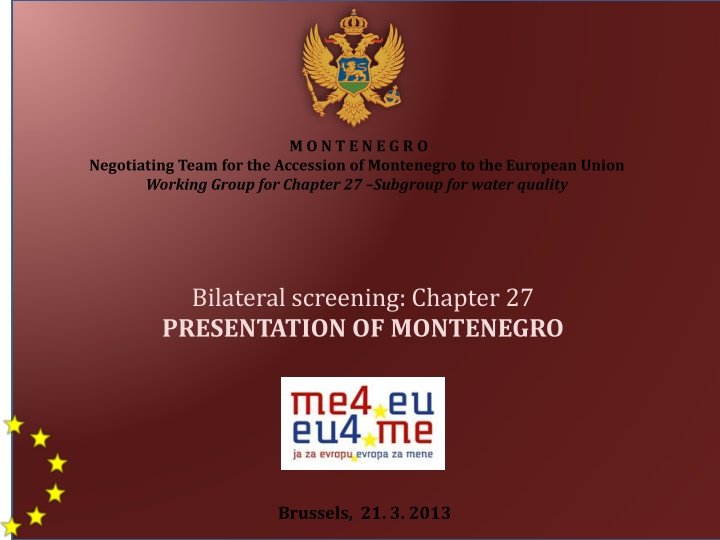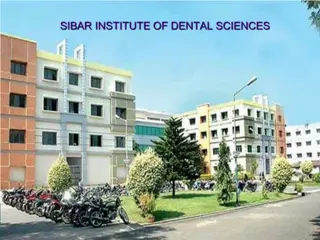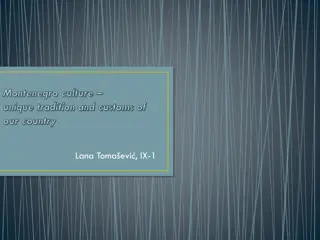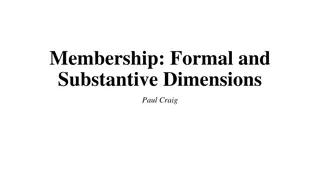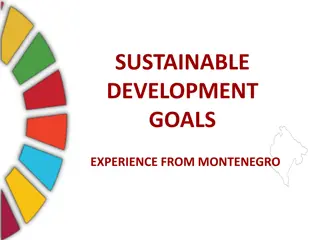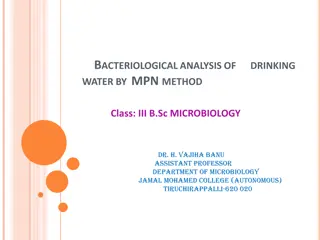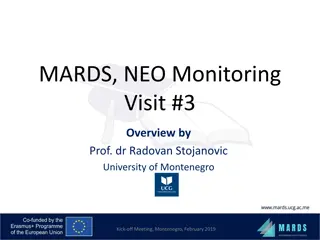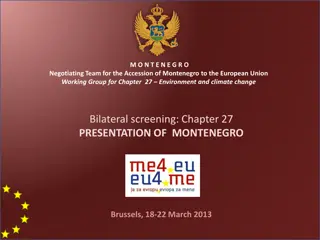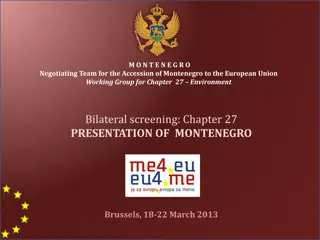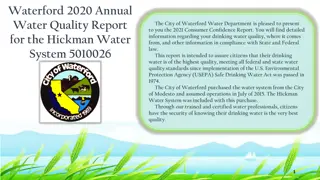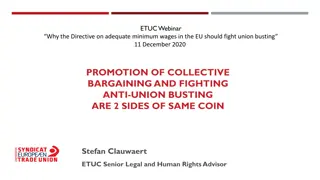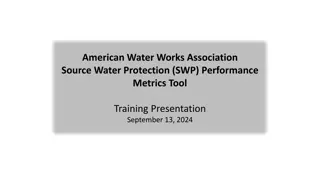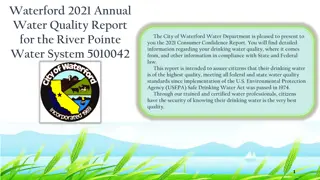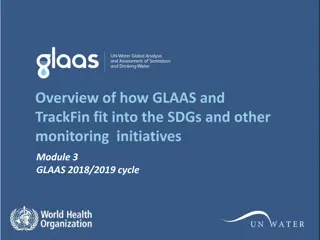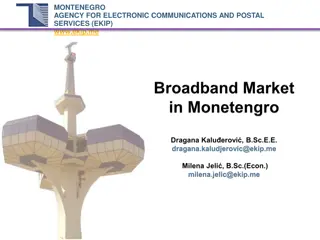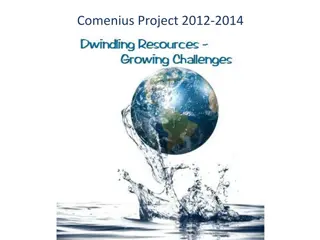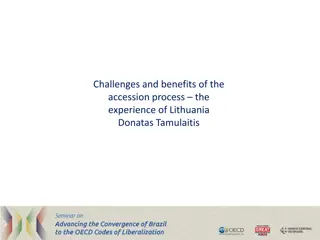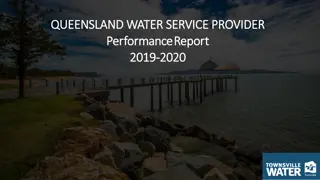Montenegro's Efforts Towards European Union Accession: Chapter 27 on Drinking Water Quality
Montenegro is actively working towards accession to the European Union, specifically focusing on Chapter 27 related to drinking water quality. The negotiation team is presenting Montenegro's progress and alignment with EU standards, emphasizing the legal and institutional frameworks in place for ensuring safe drinking water. Responsibilities of key ministries like Health and Agriculture in maintaining water quality are highlighted, showcasing Montenegro's commitment to meeting EU directives and regulations.
Download Presentation

Please find below an Image/Link to download the presentation.
The content on the website is provided AS IS for your information and personal use only. It may not be sold, licensed, or shared on other websites without obtaining consent from the author.If you encounter any issues during the download, it is possible that the publisher has removed the file from their server.
You are allowed to download the files provided on this website for personal or commercial use, subject to the condition that they are used lawfully. All files are the property of their respective owners.
The content on the website is provided AS IS for your information and personal use only. It may not be sold, licensed, or shared on other websites without obtaining consent from the author.
E N D
Presentation Transcript
M O N T E N E G R O Negotiating Team for the Accession of Montenegro to the European Union Working Group for Chapter 27 Subgroup for water quality Bilateral screening: Chapter 27 PRESENTATION OF MONTENEGRO Brussels, 21. 3. 2013
Chapter 27: Drinking Water Working Group for Chapter 27 Bilateral screening: Chapter 27 Presentation of Montenegro Marina Mi kovi -Spahi marina.spahic@mrt.gov.me Brussels, 21. 03.2013 M O N T E N E G R O Negotiating Team for the Accession of Montenegro to the European Union
Chapter 27: Drinking water Drinking Water Directive 98/83/EC M O N T E N E G R O Negotiating Team for the Accession of Montenegro to the European Union
Chapter 27: Drinking Water NATIONAL LEGAL FRAMEWORK Law on Food Safety (Official Gazette of Montenegro 14/07; Article 37) Law on Waters (Official Gazette of Montenegro 27/07; Article 51) M O N T E N E G R O Negotiating Team for the Accession of Montenegro to the European Union
Chapter 27: Drinking water NATIONAL INSTITUTIONAL FRAMEWORK The Ministry of Health and the Ministry of Agriculture and Rural Development are responsible for the policy and legislation in the area of drinking water quality. The Ministry of Agriculture and Rural Development according to the Decree on Organisation and Manner of Functioning of Public Administration (Offical Gazette of the Montenegro 05/12) is responsible for tasks related to the use of water, water land and water sources for water supply, protection of waterfrompollution; The Ministry of Health according to the Decree on Organisation and Manner of Functioning of Public Administration (Offical Gazette of the Montenegro 05/12) is responsible for tasks related to health and safety of food products of general use. M O N T E N E G R O Negotiating Team for the Accession of Montenegro to the European Union
Chapter 27: Drinking water NATIONAL INSTITUTIONAL FRAMEWORK Ministry of Agriculture and Rural Development is responsible for protection of water sources and determination of sanitary protected areas (Law on Waters, Articles 54-57) - Rulebook on establishing maintaining areas of sanitary protection of water sources and limits of these areas and Water sources for regional and public water supply which are of special interest for Montenegro are under jurisdiction of the Government (Law on Waters, Article 53). M O N T E N E G R O Negotiating Team for the Accession of Montenegro to the European Union
Chapter 27: Drinking Water NATIONAL INSTITUTIONAL FRAMEWORK Ministry of Health is responsible for: - control and monitoring of drinking water safety; - prescribing regulations for drinking water safety - Rulebook on drinking water safety (Official Gazette of Montenegro 24/2012); with previous approval from the Ministry of Agriculture and Rural Development; - the manner and scope of water quality testing, with a monitoring programme Rulebook not adopted yet - Administration for Inspection Affairs - Sanitary Inspection is responsible for water safety control - Water Inspection is responsible for the monitoring and implementation of the Law on Waters. M O N T E N E G R O Negotiating Team for the Accession of Montenegro to the European Union
Chapter 27: Drinking water TRANSPOSITION - Directive has been transposed into the Rulebook on drinking water safety (Official Gazette of Montenegro 24/2012); - 82 employees are involved in the analysis of drinking water safety; - Most of them are working in IPH, Health Centre of Bar and Cetinje, Water Supply Companies of Podgorica and Herceg Novi (internal quality control) and Ecotoxicological Examination Centre of Montenegro (CETI); - specialist of: hygiene, sanitary chemistry, toxicology and microbiology graduated chemists, psycho-chemists, engineers of technology, biologists and technician staff; M O N T E N E G R O Negotiating Team for the Accession of Montenegro to the European Union
Chapter 27: Drinking water Articles 1,TTRANSPOSITIONart), 4, 5, 6 (part), 10 are h Articles 1,2,3 (partially) 4,5,6 (partially), 10 are harmonised Article 3, paragraph 3 there is no adequate legislation and water control for small water supply systems (less than 50 persons) Article 6, paragraph 2 and 3 - not harmonised supply systems (less then 50 persons) A M O N T E N E G R O Negotiating Team for the Accession of Montenegro to the European Union
Chapter 27: Drinking Water ADMINISTRATIVE CAPACITIES Institutions IPH 20 CETI 10 HC Bar 16 HC Cetinje 6 Water Supply Company of Herceg Novi 7 Water Supply Company of Podgorica 15 Sanitary inspectors 8 M O N T E N E G R O Negotiating Team for the Accession of Montenegro to the European Union
Chapter 27: Drinking water Drinking water quality control IPH 56% Health Center Bar 30% Health Center Cetinje 13% CETI 1% M O N T E N E G R O Negotiating Team for the Accession of Montenegro to the European Union
Chapter 27: Drinking water Articles 1tIIMPLEMENTATION), 4, 5, 6 (part), 10 are h There is no monitoring programme on the national level. Article 7 - current monitoring programme based on contracts between water supply utilities and laboratories is not completely in compliance with DW Directive; Local facilities responsible for the management of water systems are obliged to ensure the monitoring of drinking water quality. The monitoring is performed by authorised laboratories. Article 3, paragraph 3 there is no adequate) M O N T E N E G R O Negotiating Team for the Accession of Montenegro to the European Union
Chapter 27: Drinking water Articles MPLIMPLEMENTATION), 4, 5, 6 (part), 10 are h 4 accredited laboratories in Montenegro 1. chemistry and microbiology laboratories of IPH; 2. chemistry laboratory of CETI; 3. chemistry and microbiology laboratories of the water supply company of Podgorica; 4. chemistry laboratory of Health center Bar accredited by Accreditation Body of Montenegro; - acrylamide and bromates are parameters that cannot be analysed in our laboratories; - the rest of parameters in DW Directive can be analyzed in the Montenegrin laboratories; Article 3, paragraph 3 there is no adequate M O N T E N E G R O Negotiating Team for the Accession of Montenegro to the European Union
Chapter 27: Drinking water IMI IMPLEMENTATIONArticles AA Local water supply companies are obliged to inform the public on water quality, disruptions in water quality in accordance with the Law on Utility Sevices. Regular informing (annual reports, monthly reports) on DW quality are provided by the Public Health Institute and Sanitary Inspection/MH. In case of incident situations, informing of the public is done by the following procedure: local water supply company informs the Public Health Institute which is in charge of running additional measuring and analysing and informs the Sanitary Inspection. The Ministry of Health is obliged to inform the public itself or to authorise the Public Health Institute to provide adequate advices to the public. Article 3, paragraph 3 there is no adequate M O N T E N E G R O Negotiating Team for the Accession of Montenegro to the European Union
Chapter 27: Drinking water FUTURE ACTIVITIES 1. Identifying all relevant individual supplies of DW (Articles 1 and 3) 2. Establishing a monitoring system (Articles 6 and 7) 3. Establishing a mechanism for providing information to consumers (Article 13) 4. Establishing a system to provide reports to the Commission (Article 13) 5. Ensuring that quality of water complies with requirements/special time scale for bromate, lead and trihalometanes (Article 14) Full implementation 30.06.2017 M O N T E N E G R O Negotiating Team for the Accession of Montenegro to the European Union
Thank you for your attention! QUESTIONS
